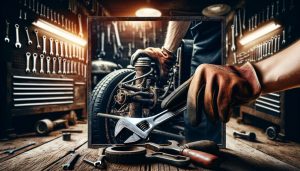
For motorcycle enthusiasts who love a challenge, auctions offer project bikes awaiting restoration. The thrill of uncovering a hidden gem and the satisfaction of bringing it back to life can be an incredibly rewarding experience.
This article provides a comprehensive guide to finding your perfect project bike at auction, from navigating the auction scene to planning the restoration process.
- Understand the different types of auctions and how to prepare for a motorcycle auction to increase your chances of success.
- Learn how to assess the condition, historical significance, and rarity of potential project bikes, as well as how to estimate restoration costs.
- Familiarize yourself with the legal aspects of auction purchases, including title verification and understanding auction terms and conditions.
- Develop a detailed restoration plan post-auction, including sourcing parts and setting a realistic timeline and budget.
- Read inspiring auction success stories to motivate and guide you through your own restoration journey.
Preparing for a Motorcycle Auction
Preparing for a motorcycle auction requires a blend of research, financial planning, and strategic thinking. Before you set foot in the auction house, it’s crucial to have a clear understanding of what you’re looking for.

This includes the type of project bike you want, the amount you’re willing to spend, and the level of restoration work you’re prepared to undertake.
- Research the auction inventory in advance to identify potential bikes.
- Set a firm budget, including a maximum bid to prevent overspending.
- Familiarize yourself with the auction process and bidding etiquette.
- Arrange for pre-auction inspection opportunities to assess bike conditions.
“Remember, the excitement of the auction can lead to hasty decisions. Always stick to your predetermined plan to avoid buyer’s remorse.”
Finally, consider the logistics of transporting your new project bike home. Ensure you have the necessary arrangements in place, such as a trailer or pickup service, to avoid any post-auction complications.
Key Strategies for Bidding on Project Bikes
When entering the competitive arena of motorcycle auctions, it’s crucial to have a game plan. Set a maximum bid limit before the auction starts to avoid getting caught in the heat of the moment and overspending. Here are some strategies to consider:
- Research the market value of the bikes you’re interested in to inform your bidding limit.
- Keep an eye on the auction pace; some items may go for a lower price if the auction is moving quickly, and bidders are distracted.
- Be prepared to walk away if the price exceeds your predetermined limit. There will always be other opportunities.
“Remember, the goal is to acquire a project bike that offers both a challenge and the potential for value increase after restoration, not to win at any cost.”
Additionally, it’s wise to factor in the buyer’s premium, which is a percentage of the final bid price that goes to the auction house. This can significantly affect the total cost of your purchase. Use the table below to keep track of potential additional costs:
| Item | Estimated Cost |
|---|---|
| Buyer’s Premium | % of final bid |
| Transportation | $XXX – $XXX |
| Initial Repairs | $XXX – $XXX |
| Storage | $XXX – $XXX |
By adhering to these strategies and keeping a clear head, you’ll be in a strong position to secure a project bike that’s right for you without breaking the bank.
Assessing Potential Project Bikes
Evaluating the Bike’s Condition
When considering a project bike at auction, the first step is to thoroughly assess its condition. Visual inspection is crucial, but it’s just the beginning. Look beyond the surface rust and dust to understand what you’re getting into. Check for signs of structural damage, such as bent frames or forks, which can be costly to repair.
“It’s essential to verify the bike’s mechanical state. A non-running bike might only need minor work, or it could be a sign of deeper issues.”
Here’s a quick checklist to guide your evaluation:
- Frame and body integrity.
- Engine condition and compression.
- Electrical system completeness.
- Rust and corrosion levels.
- Tire and wheel condition.
- Brake system functionality.
Remember, restoration is as much about passion as it is about practicality. A project bike with a solid base can provide a rewarding experience, but one with too many hidden problems can become a money pit.
Historical Significance and Rarity
When assessing a potential project bike at auction, the historical significance and rarity of the model can greatly influence both its value and the restoration approach.
Rare models with a storied past often fetch higher prices and can be more challenging to restore due to the scarcity of parts and information.
- Consider the bike’s production era and the context in which it was made.
- Research if it was involved in any notable events or owned by prominent figures.
- Determine the production numbers to understand its rarity.
“Rarity isn’t solely about numbers; it’s also about the story a bike tells and its place in motorcycle history. A model that changed the course of biking, even if mass-produced, can be considered a treasure.”
Understanding the historical context can also guide the restoration process, ensuring that the bike is returned to a state that reflects its era and significance.
This knowledge can be a deciding factor in whether to pursue a project bike or not.
Estimating Restoration Costs
Before raising your paddle for that vintage motorcycle, it’s crucial to estimate the potential restoration costs.
This financial foresight can prevent you from diving into a money pit and ensure that your project remains viable. Consider the following factors when calculating your budget:
- Parts: Are they rare or readily available?
- Labor: Will you do the work yourself, or will you need professional help?
- Time: How much of your own time are you willing to invest?
- Unexpected expenses: Always include a contingency for unforeseen issues.
“Remember, restoration is often more than just a financial investment; it’s a commitment of time and passion.”
The Legalities of Auction Purchases
Title and Ownership Verification
Verifying the title and ownership of a project bike at auction is a critical step to ensure that you are buying a legitimate vehicle and to avoid future legal issues.
Always request to see the bike’s title before bidding to confirm that the seller has the legal right to sell the motorcycle.
- Check the VIN (Vehicle Identification Number) against the title.
- Ensure there are no liens or outstanding loans on the bike.
- Verify that the title’s information matches the bike’s actual specifications.
“It’s essential to resolve any discrepancies in the title or ownership before finalizing the purchase to prevent complications down the line.”
Remember that title verification can vary by region, and some auctions may offer services to assist with this process.
Understanding Auction Terms and Conditions
Before raising your paddle at a motorcycle auction, it’s crucial to understand the terms and conditions that govern the sale.
These rules can significantly affect your bidding strategy and the overall cost of your purchase. Auction houses typically provide a set of terms and conditions that outline the legal aspects of the auction process, including buyer’s premiums, payment methods, and the transfer of ownership.
As-Is Sales: Understanding that vehicles are often sold without warranties and the implications thereof.
Restoration Planning Post-Auction
Creating a Restoration Roadmap
Once the excitement of the auction fades, it’s time to focus on the journey ahead. Creating a restoration roadmap is crucial for a successful project. This plan will guide you through each phase of the restoration, ensuring that you stay on track and within budget.
- Assess the current state of the bike: Take a detailed inventory of the motorcycle’s condition.
- Research: Look into the history and specifications of your model.
- Prioritize tasks: Determine what needs immediate attention and what can wait.
- Set milestones: Establish clear goals for each stage of the restoration.
“Remember, a well-thought-out roadmap is your blueprint for transforming a project bike into a two-wheeled treasure. It’s not just a schedule; it’s a strategic plan that takes into account the availability of parts, your own skill set, and the ultimate vision for your bike.”
Consulting with experienced restorers can provide valuable insights into the process.
They can help you anticipate challenges and offer solutions that may save you time and money. The roadmap should be flexible, allowing for adjustments as the project evolves.
Sourcing Parts and Tools
Once the excitement of the auction fades, the real work begins. Finding the right parts and tools is crucial for a successful restoration. Start by creating a comprehensive list of what you’ll need, which can be divided into two categories: replacement parts and restoration tools.
Replacement parts are specific to your bike’s make and model, while restoration tools are more general. Here’s a simple breakdown:
- Replacement Parts:
- Engine components.
- Body panels.
- Electrical systems.
- Suspension parts.
- Restoration Tools:
- Wrench and socket sets.
- Screwdrivers and pliers.
- Specialty motorcycle tools.
- Sanding and painting equipment.
“Remember, the quality of parts and tools can greatly influence the outcome of your project. opt for reputable suppliers and high-quality tools that will last through multiple restorations.”
Networking with other enthusiasts and joining online forums can lead to valuable sources for hard-to-find parts. Additionally, consider attending swap meets and checking online marketplaces.
Keep an organized record of your parts sources, costs, and the condition of parts received to streamline your restoration process.
The joy of uncovering a hidden gem is unparalleled, especially when it’s a model that’s been overlooked by others, waiting for the right person to recognize its true value.
- Research the models that are likely to appear at auction.
- Keep an eye out for bikes with unique features or historical significance.
- Be prepared to act quickly when you spot a potential hidden gem.
“Patience and persistence are key in the hunt for the perfect project bike. It’s not just about the bike itself, but the satisfaction of bringing a forgotten piece of history back to life.”
How should I prepare for a motorcycle auction?
Preparation for a motorcycle auction should include researching the types of bikes available, setting a budget, understanding the auction’s terms and conditions, and possibly registering in advance or securing a bidder’s number if required.
What are some key strategies for bidding on project bikes at auctions?
Key strategies include setting a strict budget, inspecting the bikes as thoroughly as possible before bidding, being patient, and avoiding getting caught up in a bidding war. Knowledge of the bike’s market value and potential restoration costs is also crucial.
What should I include in my restoration roadmap after purchasing a project bike at auction?
Your restoration roadmap should include a detailed assessment of the bike’s condition, a list of needed repairs and parts, a step-by-step plan for the restoration process, a timeline for completion, and a budget that includes a contingency for unexpected costs.
In conclusion, buying a motorcycle at auction is not just a transaction; it’s an experience that combines the thrill of competitive bidding with the practicality of obtaining a fantastic two-wheeled companion. From affordability to variety and transparency, auctions offer a unique avenue for motorcycle enthusiasts to rev up their passion and hit the road on their dream bike. So, whether you’re a seasoned rider or a novice, consider the excitement and value that await you at the next motorcycle auction.
Happy riding!















